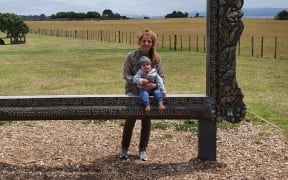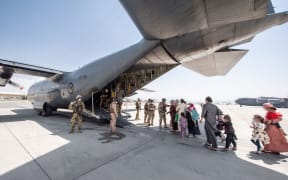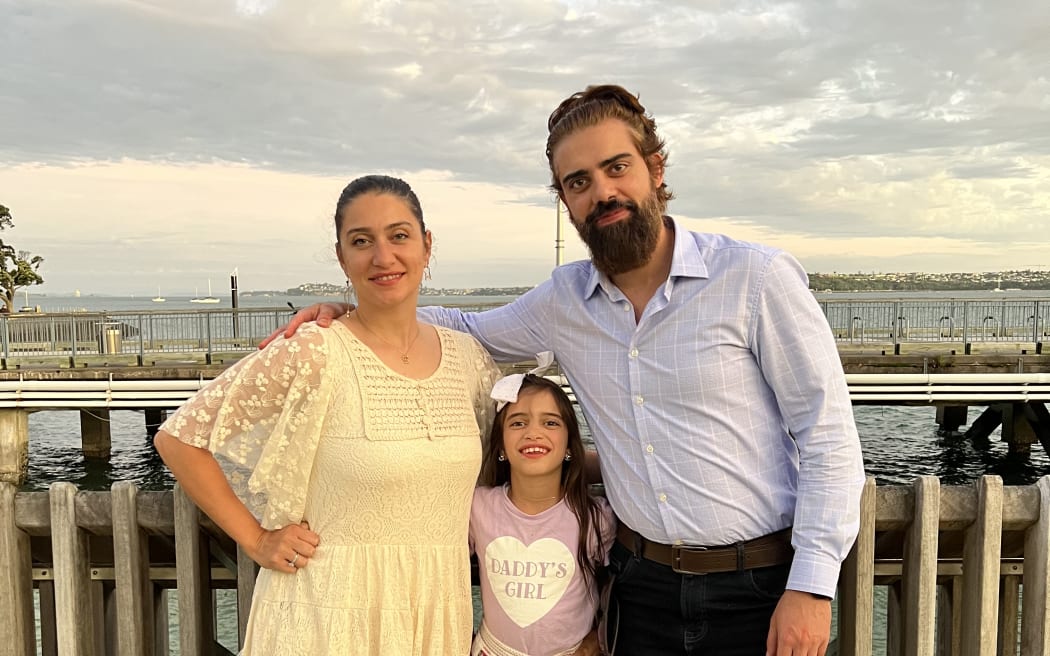
Nahed Alhaj lives in Auckland, with her IT engineer husband, Khaled, who was granted residence as a skilled migrant, and their daughter. Photo: Supplied
Middle Eastern families say they are shocked and devastated relatives have been barred from visiting because of conflict in their home countries.
They say they feel as though families already suffering in war-torn zones are being punished again - as the conflicts are being given as the reason they cannot travel.
More than 160 people from Syria and Iran have had visas rejected since August.
Nahed Alhaj lives in Auckland after her IT engineer husband was granted residence as a skilled migrant.
They cannot visit their family in Syria; the last time they were there in 2018, her young daughter was traumatised when a bomb believed to have been dropped by Israel exploded near their house, throwing them to the floor.
"It was very bad. We had a really big explosion, where we were looking outside and the wave of explosion pushed us away and we fell down on the floor. And we had a daughter that was terrified," Alhaj said.
That, and everyday living - lack of electricity and water - make a visit for them back to Syria impossible.
"It's completely unsafe for us," Alhaj said.
"I don't want to take my daughter - if she got sick or injured, it will be a disaster for us. If she was in hospital, you'd never know what would happen," she said.
"I lost my son because they didn't have enough sanitisers. My son was five days old when he died in the hospital. He had a weak heart, but the main reason he died is he got an infection inside the hospital."
But the family is also hitting brick walls trying to have the grandparents visit them here instead.
Alhaj is resigned to not even applying for a visa for her mother. "She has got her own house but she doesn't work, she doesn't have a husband, she would get declined."
Instead, she is moving her to Dubai in the hope a residence visa there will boost her chances of a trip here.
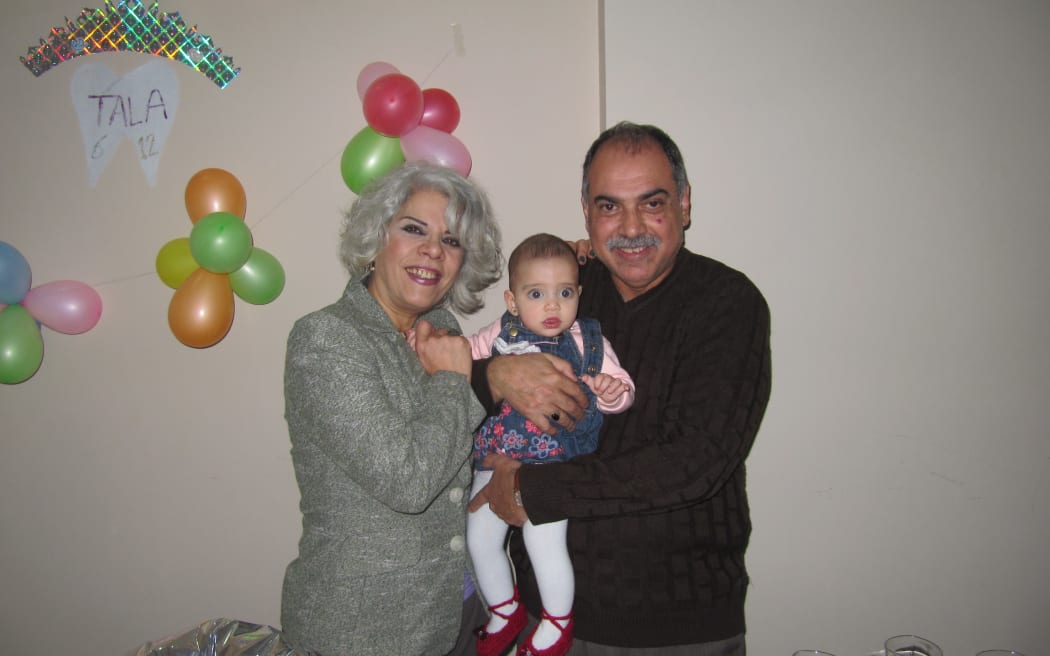
Nahed Alhaj's mother-in-law and father-in-law, whose visa was denied despite having a family, job, and house to go back to in Syria. Photo: Supplied
In the meantime, the family concentrated their hope on a visit from her father-in-law, a journalist and electronic engineer.
"He would come by himself and he will leave his wife, his wife for over 40 years. He would come just by himself to give them proof that he is coming back home, because he left his wife behind. And he left his house and his job and he has another daughter," Alhaj said.
"Of course they declined it because - I forget the exact words - the meaning was they can't trust he would go back to Syria and he would stay here and break his visa," she said.
"We found that we are not the only ones. Many, if not all, of the people we know who tried to bring their parents from Syria for visits got their applications declined. Frankly, we don't know anyone who succeeded in bringing their parents from Syria for a visit.
"It's really sad to feel that our parents are second-class human beings just because they are coming from a country torn by war."
Another visa application meant a long overnight trip to Lebanon for a medical check - as per the requirements - with no guarantee of a different result, Alhaj said.
'Subject to prejudice'
Auckland data anaylst Amin Saedi's Iranian parents, aged in their 70s, have been rejected twice since applying to visit in September.
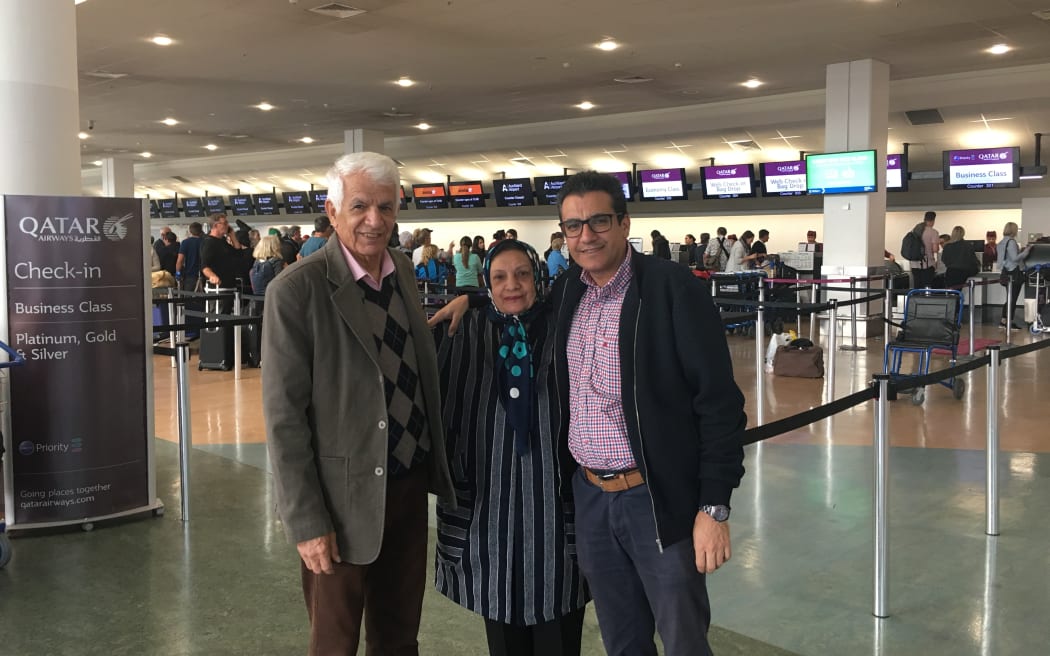
Iranian data analyst Amin Saedi with his parents on their 2019 visit to Auckland. Photo: Supplied
The first Immigration New Zealand (INZ) letter said they were not bona fide visitors, and supplied an incorrect telephone number for inquiries. An email from Saedi did not get a response and he applied for them again with more information.
"We are not satisfied that you have provided sufficient evidence of a significant reasons [sic] to return to your home country," said the second rejection, sent on Monday.
"We have appropriately weighed and balanced your reasons to come to New Zealand. While you have a reason to come to New Zealand to meet your family member.[sic] The current economic and geopolitical situation in Iran is too significant of a reason for you not to return [sic]. "
If he cannot see them in Iran, because the Ministry of Foreign Affairs and Trade deems it unsafe, and New Zealand authorities do not allow visits here, he wonders how he will ever see them again.
"I always do my best work in contributing to the country, this is the government's turn now in return to help me and support me, not to be against me. Why do they punish me and my parents to visit each other? They don't want to stay here, they just want to come and visit me and that's it.
"They came before in 2019 and proved that they will return to Iran on time. I want to see my father and mother. These are my one father and mother, I only have one and if something happened to them, and if I have not any chance to see them anymore, who is responsible?"
They had applied before last September's protests in Iran.
So too another Iranian man, who had been getting visas for his parents over the 15 years he has lived in Wellington without issue. But that changed when his 73-year-old father applied in August.
They most recently returned from a visit here in March 2021. He was on a visitor visa to see family in Canada when violence broke out - nevertheless he returned home.
The visa decision has prompted the government technology consultant to think about emigrating again.
"Expecting this to go as smoothly as ever, and then coming back and making this ill-informed and very inconsiderate judgment call was very frustrating.
"The thing is, after 15 years, I still feel I'm a foreigner. I'm subject to prejudice. And because I was born in a different country, I have to still - having been a citizen for more than 10 years - I still need to go several miles more than everybody else to get my basic rights."
In a statement, Immigration New Zealand said it understood their predicaments but it was simply applying the rules.
"We empathise with the difficult situation that these families find themselves in because of the circumstances in their home countries of Iran and Syria.
"Applications for temporary entry into Aotearoa New Zealand could be declined for various reasons, and our role as a regulator is to apply relevant immigration instructions to all visa applications.
"Applicants must supply information which demonstrates that they meet the requirements to be granted a visa. During the application process we consider the applicants' intentions for travel, and whether they are likely to [go] home at the end of their stay. Those who are unable to demonstrate that they meet the requirements for a visa may be declined."

